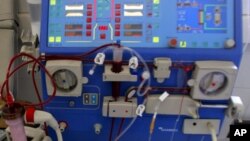Amid rapid urbanization, the HIV epidemic and increasing rates of non-communicable diseases, people in sub-Saharan Africa are especially vulnerable to kidney disease.
Medical experts are meeting in Cameroon to examine ways of reducing the rising incidents of chronic kidney disease.
A dialysis machine at the hemodialysis center in Cameroon's capital city, Yaounde, extracts blood from kidney patients, then filters and measures it before it is returned to the body.
Among the hundreds of dialysis patients at at the center is Ngalla Priscilia.
"I started dialysis in 2002. What damaged my kidney was high blood pressure. The dialysis itself is not expensive. What is killing us here is the drugs and the [laboratory] tests that we have to do," she said.
Priscilia says her condition was detected early enough, thanks to her cousin, who is a nurse.
Cameroon's Kidney Foundation reports a majority of kidney patients in the country go to the hospital when the disease is at an advanced stage. Many others die without ever being diagnosed.
Maintenance issues
Bertrand Balagock, president of the Yaounde Association of People Living with Kidney Defects in Yaounde, says regular treatment is not always possible because most of the machines are not maintained properly. He says instead of the four hours of treatment, patients may undergo just three hours of dialysis.
He says only seven of the 20 machines at the center are functioning and that is greatly destabilizing patients. He says a patient who had to be treated on Monday is treated on Wednesday or Thursday and the water room that is very vital in dialysis treatment is not functioning regularly and people can not be treated effectively for dialysis.
Cameroon has about 2,000 patients with acute kidney infections, up from 400 in 2012.
Gloria Ashungtantang, an official of the dialysis center, says the number of people with kidney problems is growing.
"Any severe infection would cause the kidney to shutdown," she said. "Acute kidney failure linked to pregnancy is a major cause in our environment. Chronic kidney failure, what are the causes? Diabetes, hypertension and chronic infections. Avoid obesity. Exercise to lose weight. Avoid smoking, avoid taking non-prescribed drugs. Sugary drinks are very dangerous."
Lack of access
According to the U.S.-based National Kidney Foundation, 10 percent of the world's population is affected by chronic kidney disease and millions die each year because they do not have access to affordable treatment.
Kitty Jager, a nephrologist from the Netherlands, says another contributing factor to the increase in kidney disease is that most medical staff, especially in developing countries, are not learning new treatment methods.
"Many doctors have been trained by universities and end up at a particular level of medical knowledge, but then all the new knowledge that they will gain after their graduation will be from reading the literature, listening to presentations where people report on their scientific data," said Jager. "They need to know very well how they should interpret results of particular studies so that they can use this for their medical work."
Jager says one of goals at the meeting in Yaounde is to find ways of training as many nephrologists as possible to enable them to do scientific research and be able to read scientific publications so that they can interpret the data.
Experts are calling on the population to encourage early screening, saying that kidney disease often has no symptoms, and can go undetected until very advanced. But a simple urine test can detect the disease.




